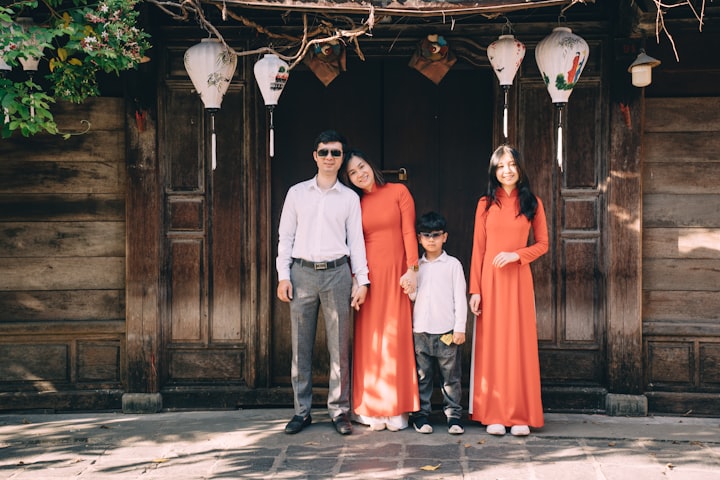How to create a family culture rooted in cooperation and teamwork?
Families can create a culture of cooperation and teamwork that helps them to overcome challenges

A family is a team, and like any team cooperation and teamwork are essential for success. It can create a strong sense of unity and belonging when all family members work together, share their goals, and support each other through challenges. A family culture based on cooperation and teamwork can lead a family toward healthier relationships, better communication, and more efficient problem-solving.
However, it is not easy to create a culture of cooperation and teamwork in a family. Family members have different personalities, interests, goals, and priorities, and conflicts can arise. Additionally, it is difficult to find time to connect and work together as a family in this fast-paced nature of modern life.
But with the right strategies and tools, tips, and tricks families can create a culture of cooperation and teamwork that helps them to overcome challenges and achieve their goals. Open communication, setting shared goals, assigning responsibilities, practicing conflict resolution skills, and fostering a positive and supportive environment, are some golden tips through which families can strengthen their bonds and relationships, and create a sense of unity that lasts a lifetime.
In this article, we will explore these golden tips in more detail that can help families to develop these skills.
Communication is Key
Communication is the foundation of any successful and healthier relationship, and it's no different in a family setting. It's essential to establish an open and honest communication within the family. Regular family meetings are a great way to start up. These meetings allow family members to share their thoughts, feelings, and ideas about any family or personal issue. Encourage each family member to listen to each other peacefully and respect each other's perspectives. When each family member feels heard and valued, it fosters a culture of cooperation and teamwork within the family.
When disagreements arise, encourage family members to discuss them calmly and find solutions to achieve the goals. By fostering open communication, family members can feel heard and understood which helps to build trust and cooperation between family members.
Establish Family Goals
For a happy family, it is necessary to set family goals that can create a sense of unity and purpose. Encourage each family member to contribute to the goal-setting process. It's essential to set realistic goals that align with each family member's interests and strengths. Make sure everyone knows the importance of each goal and how they can contribute to its success. Celebrate each milestone achieved along the way and take time to reflect on what worked and what didn't.
Setting shared goals as a family can also create a sense of purpose and cooperation. Encourage family members to contribute their ideas and opinions when setting goals, and make sure everyone understands the importance of goals and plays their role in achieving those goals. Celebrate the achievements as a team to reinforce the importance of working together towards a common goal.
Delegate Responsibilities
Assigning age-appropriate responsibilities to each family member teaches them the importance of teamwork and accountability in a family. Delegating tasks also helps to decrease the workload of the primary caregivers. Encourage family members to take ownership of their responsibilities and provide support and guidance when they are needed. When each family member contributes to the family's well-being, and ownership of his/her duties it fosters a sense of pride and unity. By holding each other accountable, family members can learn to rely on each other and build trust that everyone will do their part.
Celebrate Achievements
It is also important to celebrate each family member's achievements, no matter how big or small. It's essential to acknowledge their hard work and dedication to others. Celebrating achievements can also create a sense of motivation, inspiration, and happiness for others to strive for excellence. Encourage each family member to support and uplift each other for better results.
Conflict is inevitable in any team, including family. Encourage family members to practice conflict resolution skills, such as active listening, empathy, and compromise for a peaceful environment. When family members learn to resolve conflicts respectfully and constructively, it strengthens their relationships, bonding and builds trust.
Practice Gratitude
Encourage family members to practice gratitude regularly which creates a positive and supportive environment. Gratitude helps to cultivate a positive mindset and encourages everyone to focus on what they have rather than what they don't have, also gives them the strength to achieve what they don’t have. Make it a habit to share what each family member is grateful for during family meetings or meals. Practicing gratitude fosters a culture of positivity and appreciation.
Creating a positive and supportive environment can foster a sense of unity and cooperation within a family for better work. Encourage family members to support each other through words and actions, and to celebrate each other's achievements no matter how big or small. Family members are more likely to contribute positively to the family when they feel valued and supported.
Foster Empathy
To understand and share another person's feelings is called Empathy. Encourage each family member to practice empathy towards each other for a healthier relationship. When family members are empathetic, they are better able to understand and support each other emotionally and materialistically. This creates a sense of unity and teamwork within the family.
Empathy is a valuable talent for strengthening connections and collaboration in the family. Encourage family members to practice empathy to better understand and support one another. This may be accomplished by promoting active listening, asking open-ended questions, and attempting to view things from the perspective of the other person.
Parents may demonstrate empathy by carefully listening to their children and attempting to understand their sentiments, even if they disagree with them. Encouragement of empathy for siblings and other family members may help youngsters develop social and emotional intelligence, which can assist them in many aspects of their lives.
Respect Differences
Each family member is unique, with their strengths, weaknesses, goals, and personalities. It is necessary to encourage each family member to respect and appreciate each other's differences. Celebrate each family member's individuality and use their unique strengths to contribute to the betterment of the family.
Parents may teach their children to tolerate differences by expressing interest in their children's hobbies, even if they don't share them. Helping siblings to accept one other's uniqueness and discover common ground will help them have a more pleasant connection. It is critical to note that disputes might emerge because of personality, interest, or value differences. Helping family members to develop empathy and communication skills can aid in the resolution of disagreements in a courteous and productive manner.
Create Family Traditions
Family traditions create a sense of belonging and unity and happiness. Encourage each family member to contribute to creating family traditions that reflect their interests and values but also take care of others' interests and values. Traditions may be as simple as a weekly family game night or as elaborate as an annual family vacation. The important thing is to create meaningful experiences that bring the family together.
Developing family traditions may be a collaborative effort, with each family member offering ideas and preferences. It is critical to incorporate children in the process so that they feel as though they have a say in the family's activities. Family traditions may also be used by parents to instill vital values and life skills in their children, such as gratitude, collaboration, and problem-solving.
Practice Active Listening
Active listening is the practice of fully concentrating on what the other person is saying and responding in a way that shows understanding and empathy toward others. Encourage each family member to practice active listening when communicating with each other during a family meeting or meal. When family members feel heard and understood, it creates a culture of cooperation and teamwork.
Practice Forgiveness
Forgiveness is an essential ability for developing and sustaining relationships. Conflict and conflicts are unavoidable in any relationship, especially familial relationships. Encourage family members to forgive one another to help overcome problems and establish trust within the family.
Parents may set a good example of forgiveness by recognizing their mistakes and apologizing when required. When arguments erupt, encouraging children to apologize and forgive one other can help them develop essential social and emotional skills. It's critical to understand that forgiveness does not imply ignoring or tolerating wrongdoing. It entails admitting wrongdoing and cooperating to find a solution and move ahead.
Lead by Example
As a parent or caregiver, you are the primary role model for your children in your family. It's essential to lead by example and demonstrate the values and behaviors you want your children to adopt in their lives. When family members see you practicing cooperation and teamwork, they are more likely to follow your actions and words.
Conclusion
In conclusion, a family culture is rooted in cooperation and teamwork takes intentional effort and dedication. Establishing open communication, setting family goals, delegating responsibilities, celebrating achievements, and practicing gratitude are practical strategies that can help foster a culture of teamwork and cooperation within a family. These strategies can serve as valuable resources for families seeking to strengthen their bonds and relationships
About the Creator
tabinda khalid
Tabinda Khalid writes articles on Human Psychology and mental health. She owned her a Post-Graduate degree in Psychology and also has three years of experience in a clinical setup. For more information
https://mentaldisoeders.blogspot.com






Comments
There are no comments for this story
Be the first to respond and start the conversation.